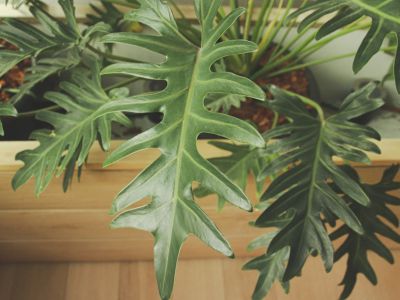Tree vs. Split Leaf Philodendron
Before getting into how to repot a lacy tree philodendron, we must first explain the confusion often associated with growing these and split leaf philodendrons. While they look alike and sometimes go by the same name, these are two totally different plants. Split leaf philodendron plants (Monstera deliciosa), aka Swiss cheese plants, are characterized by the large holes and fissures that appear naturally in the leaves with exposure to the sun. The split leaf philodendron is not actually a true philodendron, but it is closely related and can be treated as such, particularly when it comes to repotting, and is normally lumped into the same care regimen, though being of differing genera. Philodendron bipinnatifidum (syn. Philodendron selloum) is known as the tree philodendron and may occasionally be found under such names as lacy tree philodendron, cut-leaf philodendron, and split-leaf philodendron (which is incorrect and the cause for confusion). This tropical “tree-like” Philodendron species also has leaves that are “split” or “lacy” looking and grows easily as a houseplant or in suitable areas outdoors in warm climates.
Transplanting a Lacy Tree Philodendron
Philodendron is a tropical plant that grows vigorously and requires frequent repotting if grown in a container. It actually responds very well to slight crowding, however, so with each repotting you should move it to a container that is only a little bit larger. If you can, choose a pot that is 2 inches (5 cm.) wider in diameter and 2 inches (5 cm.) deeper than your current pot. As tree philodendrons can get quite large, you may want to consider choosing a pot size that is easy to manage, like with a 12-inch (30.5 cm.) pot for easier lifting. Of course, larger options are available and if you have a larger specimen, this might be more favorable but for more ease of care, opt for something with wheels or coasters to keep its movement in and outdoors simpler.
How and When to Repot Tree Philodendrons
You should be repotting your tree philodendron, as with all repottings, in early spring just as the plant is emerging from its winter dormancy. Ideally, daytime temperatures should be reaching 70 degrees F. (21 C). Fill the bottom third of the new container with potting soil. Gently slide your plant out of its current container, your palm flat against the soil and the stem resting firmly between two fingers. Over the pot, delicately shake out as much of the soil from the roots as possible, then set the plant inside the container, spreading out the roots. Fill the container with potting soil up to its previous level on the plant. Water your plant until water trickles out of the drainage holes. Place the plant back in its old spot and don’t water it again until the top layer of soil is dry. You should notice new growth in four to six weeks. If transplanting a lacy tree philodendron is simply impossible because it’s too big, remove the top 2 to 3 inches (5-7.5 cm.) of soil and replace it with fresh potting soil every two years.
